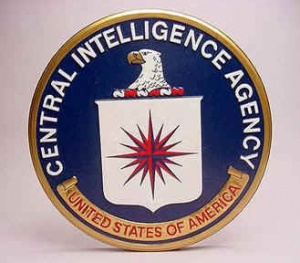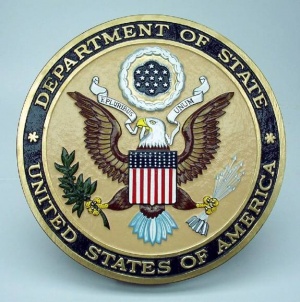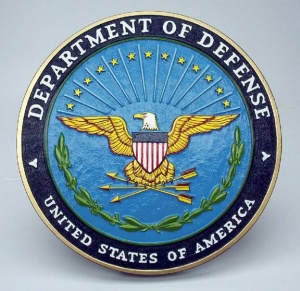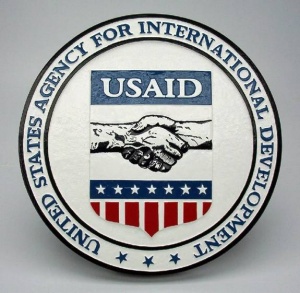Difference between revisions of "The USC Center on Public Diplomacy advisory board"
(→USAID et al) |
|||
| Line 46: | Line 46: | ||
== USAID et al == | == USAID et al == | ||
| − | [[Image:USAID14.jpg|thumb|right]] | + | [[Image:USAID14.jpg|thumb|right|The USAID shield]] |
Max Holland in a 1984 [http://findarticles.com/p/articles/mi_hb1367/is_198412/ai_n6393311 Nation article Wick's last tapes] asserts that: | Max Holland in a 1984 [http://findarticles.com/p/articles/mi_hb1367/is_198412/ai_n6393311 Nation article Wick's last tapes] asserts that: | ||
:"Aside from Labor Secretary [[Raymond Donovan]], the Administration official who has caused President Reagan the greatest embarrassment is Charles Z. Wick, director of the United States Information Agency. In Reagan's first term, the press reported that Wick had given jobs to the children of Cabinet members [the Senate investigation into the hiring dubbed it "kiddiegate"], had secretly tape-recorded his telephone conversations and had ordered the U.S.I.A. to maintain a blacklist of liberals who would not be sent aborad under the agency's auspices (among those banned, Senator Gary Hart and Walter Cronkite). | :"Aside from Labor Secretary [[Raymond Donovan]], the Administration official who has caused President Reagan the greatest embarrassment is Charles Z. Wick, director of the United States Information Agency. In Reagan's first term, the press reported that Wick had given jobs to the children of Cabinet members [the Senate investigation into the hiring dubbed it "kiddiegate"], had secretly tape-recorded his telephone conversations and had ordered the U.S.I.A. to maintain a blacklist of liberals who would not be sent aborad under the agency's auspices (among those banned, Senator Gary Hart and Walter Cronkite). | ||
| − | + | ||
The Reagan administration also rewarded its friends by pumping money into the conservative infrastructure. Inside the National Security Council, former CIA propagandist Walter Raymond Jr. coordinated plans for enlisting private organizations into wide-ranging "public diplomacy" operations. Raymond's operation — initially called "Project Truth" and later “Project Democracy”— enlisted foundations in a novel public-private strategy. [http://www.consortiumnews.com/1999/080499a3.html Consortium News states]: | The Reagan administration also rewarded its friends by pumping money into the conservative infrastructure. Inside the National Security Council, former CIA propagandist Walter Raymond Jr. coordinated plans for enlisting private organizations into wide-ranging "public diplomacy" operations. Raymond's operation — initially called "Project Truth" and later “Project Democracy”— enlisted foundations in a novel public-private strategy. [http://www.consortiumnews.com/1999/080499a3.html Consortium News states]: | ||
:"Dated June 14, 1982, and entitled "Project Democracy: Proposals for Action," a draft proposal spelled out plans for drawing non-governmental organizations into the process. The plan also called for harnessing financial resources from a "coalition of wealthy individuals"; U.S. defense contractors; and private foundations, such as the Twentieth Century Fund." | :"Dated June 14, 1982, and entitled "Project Democracy: Proposals for Action," a draft proposal spelled out plans for drawing non-governmental organizations into the process. The plan also called for harnessing financial resources from a "coalition of wealthy individuals"; U.S. defense contractors; and private foundations, such as the Twentieth Century Fund." | ||
| + | |||
==Notes== | ==Notes== | ||
<references/> | <references/> | ||
Revision as of 20:27, 17 September 2008
The USC Center on Public Diplomacy advisory board is as follows.
- Rebecka Belldegrun, President and CEO, BellCo Capital, LLC : A graduate of Tel Aviv University Medical School, Dr. Belldegrun completed her residency in Israel and her fellowship in ophthalmology at Massachusetts Eye and Ear Hospital of Harvard Medical School. She serves as Chairman Emeritus of the Board of Trustees at Brentwood School, is a member of the Board of Advisors at RAND Corporation, the Board of Visitors at Columbia University, a member of the University of Pennsylvania Parents Leadership Committee and serves as a member of the Board of the Tel Aviv Foundation.
- Fernando Henrique Cardoso, President of the Fernando Henrique Cardoso Institute: Cardoso served two terms as the President of the Federal Republic of Brazil, ending in January 1st, 2003. Cardoso is chairman of the Club of Madrid and co-chairman of the Inter-American Dialogue. He is also a member of the Board of Trustees of the Rockefeller Foundation, New York, and of the Institute for Advanced Study, Princeton. Cardoso is also professor "at large" at Brown University in Providence, Rhode Island; and holder of the "Cultures of the South" chair at the Library of Congress, Washington, D.C. He recently presided over the United Nations Panel of Eminent Personalities on the relationship between the organization and civil society and coordinated the working group in charge of reviewing the Ibero-American Summitry process.
According to Greg Palast, Cardoso, is now reviled as 'an incompetent and a cheat':
- "There is nothing much left to Cardoso’s presidency but the title. All meaningful policies, from spending to employment, are dictated by the International Monetary Fund and its brethren agencies. And behind them, calling the shots, is Treasury Secretary Rubin who rules as de facto President of Brazil without having to miss a single Manhattan cocktail party. But this is the price Cardoso pays for Rubin’s election campaign services. For it was the US Treasury which, with the IMF, kept Brazil’s currency aloft. Rubin had good reason to maintain Brazil’s dubious coinage besides helping Cardoso. Knowing full well the currency would go to pieces right after the elections, the US Treasury made sure American banks could get their money out of the country on favorable terms. Between last July and the inauguration this January, Brazil’s dollar reserves dropped from $70 billion to $26 billion, a sign the bankers had grabbed their money and run. Yet the currency stayed afloat before the election because the US made clear its intention to replace lost reserves with an IMF loan package."
- Hodding Carter, III: President and CEO of the John S. and James L. Knight Foundation and has worked on two successful presidential campaigns - Lyndon Johnson's 1964 campaign and Jimmy Carter's 1976 bid for the presidency. He served in the Jimmy Carter administration as spokesman for the Department of State and Assistant Secretary of State of Public Affairs. Carter served as host, anchor, panelist, correspondent and reporter for a variety of public affairs television shows on PBS, ABC, CBS, BBC and CNN. He served as a Washington-based opinion columnist for The Wall Street Journal for 10 years, and was a syndicated columnist with United Media/NEA in the early 1990s. Carter is also a frequent contributor to The New York Times, The Washington Post and many other newspapers and magazines.
Henry Catto, Former Ambassador to the U.K. and El Salvador: He has been director of the United States Information Agency (1991-93), U.S. Ambassador to the United Kingdom (1989-91), Assistant Secretary of Defense for Public Affairs and Pentagon Spokesman (1981-83), U.S. Representative to the United Nations Offices in Geneva (1976-77), Chief of Protocol, White House and Department of State (1974-76), U.S. Ambassador to El Salvador (1971-73), and Deputy Representative to the Organization of American States (1969-71).
From 1983 to 1989, he was vice chairman and president of Broadcast Group at H & C Communications, operator of network television stations. Henry E. Catto was elected chairman of the Atlantic Council of the United States in January 1999. He is also a member of the Council of Foreign Relations, a contributing Editor to the American Journalism Review magazine, Vice-Chairman of the Aspen Institute, and is on the Advisory Board of Direct Relief International.
Kimberly Marteau Emerson, Former Director of the Office of Public Liaison at the USIA
- Bruce Gelb, President of the Council of American Ambassadors: He is at present a senior consultant to Bristol-Myers Squibb Company. Gelb had been appointed Commissioner for the United Nations, Consular Corps and International Business by New York City Mayor Rudolph W. Giuliani, serving from 1994 to 1997. In this capacity, Commissioner Gelb was responsible for the strategy and implementation of actions to bring international businesses to New York City and the retention of resident foreign companies, the United Nations and its agencies.
Gelb served in the George H.W. Bush administration as the U.S. Ambassador to Belgium (1991 – 1993) and as Director of the U.S. Information Agency (1989 – 1991). Prior to his service in government, he was Vice Chairman of the Board of Bristol-Myers Company. Bruce Gelb has served as a member of President Bush’s Arts and Humanities Committee and as a member of the Board of Trustees of the John F. Kennedy Center for the Performing Arts. He is also a former Trustee of Howard University and a past Board member of the New York City Economic Development Corporation.
- Vartan Gregorian, President of Carnegie Corporation of New York, a grant-making institution founded by Andrew Carnegie in 1911. He was born in Iran, and is the author of Emergence of Modern Afghanistan, 1880-1946. He is a Ford Foundation Foreign Area Training Fellow, and currently serves on the boards of the Institute for Advanced Study at Princeton, Human Rights Watch. He served on the boards of theJ. Paul Getty Trust, the Aga Khan University, and the Bill and Melinda Gates Foundation.
- Betty King, Former U.S. Ambassador to the Economic and Social Council of the United Nations.
- Kevin Klose, President and CEO for National Public Radio (NPR). A former editor, and national and foreign correspondent with The Washington Post. Prior to joining NPR in December 1998, Klose served successively as Director of U.S. International Broadcasting, overseeing the U.S. Government's global radio and television news services (1997-98); and President of Radio Free Europe/Radio Liberty (RFE/RL), broadcasting to Central Europe and the former Soviet Union (1994-97). Klose first joined RFE/RL in 1992 as Director of CIA-connected Radio Liberty, broadcasting to the former Soviet Union in its national languages.
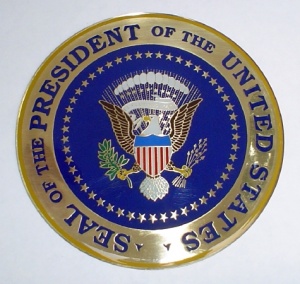
As RFE/RL President, Klose radically downsized RFE/RL and moved it from Munich, Germany, to Prague, the Czech Republic . He also helped devise and implement a strategy to coordinate all U.S.-funded international broadcasting (Voice of America, Radio Free Europe/Radio Liberty, Radio Free Asia, Radio/TV Marti, Worldnet Television) in the post-Cold War.
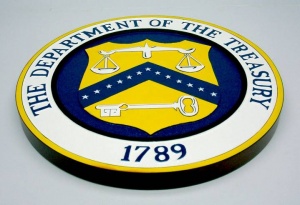
- Gary E. Knell, President and CEO, Sesame Workshop. Sesame Street's 'global mission', includes South Africa, Russia, China, and Egypt. Previously, Knell was Managing Director of Manager Media International, a print and multimedia publishing company based in Bangkok, Hong Kong, and Singapore. In this capacity, he oversaw the development of the monthly business magazine Asia Inc., the daily Asian-based newspaper Asia Times, and several trade publications.
He also has served as Senior Vice President and General Counsel at WNET/Channel 13 in New York, was Counsel to the US Senate Judiciary and Governmental Affairs Committees, and worked in the California State Legislature and Governor's Office. Knell is a member of the Council on Foreign Relations and a participant in the Aspen Institute Forum on Communications and Society as well as the Columbia University American Assembly.
- Markos Kounalakis, President and Publisher, Washington Monthly magazine. He worked as the NBC Radio and Mutual News Moscow correspondent and covered the fall of the Soviet Union as well as the war in Afghanistan. He reported the overthrow of communism for Newsweek in East Germany, Czechoslovakia, Romania, and Bulgaria, the rise of both democratic institutions in Hungary and of ethnic strife in Yugoslavia. He was based in Rome and Vienna and later ran the magazine’s Prague satellite bureau for over a year.
Kounalakis has written for The Wall Street Journal, The Los Angeles Times Magazine, The International Herald-Tribune, The San Francisco Chronicle, The Dallas Morning News, and many other regional and international newspapers and magazines. He is the author of the book Defying Gravity: The Making of Newton (1993) and co-author of Beyond Spin: The Power of Strategic Corporate Journalism (1999). Board of Trustees of the Western Policy Center 2001-2005. In June 2003, he chaired a multinational reconstruction conference in Athens, Greece where Iraq's media laws were drafted.
- Joseph S. Nye, Jr.,Nye is the Sultan of Oman Professor of International Relations at the JFK School of Government, Harvard. Nye has been on the faculty at Harvard since 1964, during which time he also served as Assistant Secretary of Defense for International Security Affairs, Chair of the National Intelligence Council, and Assistant Secretary of State for Security Assistance, Science and Technology. Nye served as Dean of the Kennedy School from 1995 through 2004. His seminal book, Soft Power: The Means to Success in World Politics, was published in 2004. Some of his other publications are Understanding International Conflicts, 4th edition (2002), The Paradox of American Power (2002), and an edited volume, For the People: Can We Fix Public Service? (2003). Nye received his bachelor's degree summa cum laude from Princeton University, did postgraduate work at Oxford University on a Rhodes Scholarship, and earned a Ph.D. in political science from Harvard.
- Ponchitta Pierce, Journalist, producer.
- Keith Reinhard, Chairman of DDB Worldwide, the second largest advertising/marketing network in the world. In 1986, he was one of the architects of the advertising industry's only three-way merger, creating Omnicom, one of the world's largest advertising and marketing services holding companies. Concurrent with the creation of Omnicom, he managed the merger of Doyle Dane Bernbach and Needham Harper Worldwide, first known as DDB Needham Worldwide and now DDB Worldwide. Reinhard also is known for his creative work with McDonald's, including 'You Deserve a Break Today,' which in 1999 was voted the number one jingle of all time in Advertising Age's 'The Century of Advertising.' He is a past Chairman of the American Association of Advertising Agencies and remains a member of its advisory council.
- Elizabeth Rohatyn Founder and Chairperson, Teaching Matters, Inc.
- Charles Z. Wick: From 1981 through 1988, Wick was director of the United States Information Agency (USIA) under President Reagan. As USIA director, Wick launched the first live global satellite television network.
Wick also established the Voice of America's Radio Marti broadcasting to Cuba; created RIAS TV in Berlin; headed the International Youth Exchange Initiative; established an office within USIA to implement the General Exchanges Agreement between the U.S. and the former Soviet Union; and created the Artistic Ambassador Program with its international young artists' exchanges. Wick has been an independent businessman involved in the financing and operation of motion picture, television, radio, music, health care, and mortgage industries in the United States and abroad. He was previously president and chief executive officer of Wick Financial Corp., and Mapleton Enterprises, which he founded in the early 1960's. He was cochairman of the 1981 Presidential Inaugural Committee.[1]
USAID et al
Max Holland in a 1984 Nation article Wick's last tapes asserts that:
- "Aside from Labor Secretary Raymond Donovan, the Administration official who has caused President Reagan the greatest embarrassment is Charles Z. Wick, director of the United States Information Agency. In Reagan's first term, the press reported that Wick had given jobs to the children of Cabinet members [the Senate investigation into the hiring dubbed it "kiddiegate"], had secretly tape-recorded his telephone conversations and had ordered the U.S.I.A. to maintain a blacklist of liberals who would not be sent aborad under the agency's auspices (among those banned, Senator Gary Hart and Walter Cronkite).
The Reagan administration also rewarded its friends by pumping money into the conservative infrastructure. Inside the National Security Council, former CIA propagandist Walter Raymond Jr. coordinated plans for enlisting private organizations into wide-ranging "public diplomacy" operations. Raymond's operation — initially called "Project Truth" and later “Project Democracy”— enlisted foundations in a novel public-private strategy. Consortium News states:
- "Dated June 14, 1982, and entitled "Project Democracy: Proposals for Action," a draft proposal spelled out plans for drawing non-governmental organizations into the process. The plan also called for harnessing financial resources from a "coalition of wealthy individuals"; U.S. defense contractors; and private foundations, such as the Twentieth Century Fund."
Notes
- ↑ Charles Z. Wick accessed 10 July 2008
